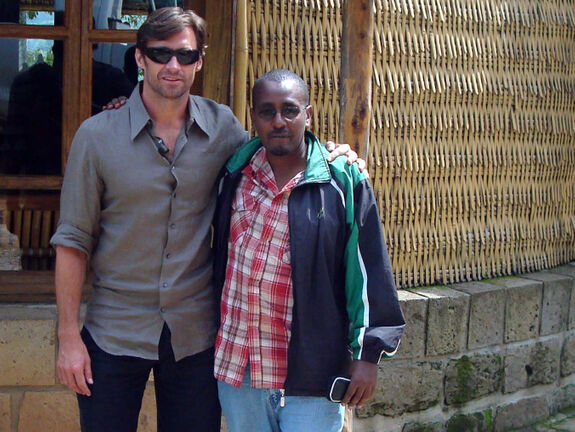Frequently Asked Questions
Here are some frequently asked questions and interesting facts about Ethiopia.
One of the wonderful aspects of hosting guests to our country is having the opportunity to share information about Ethiopia's history, culture and contemporary lives. And these conversations also give our guides the valuable and appreciated chance to learn about your life. So please feel encouraged to ask us any question that comes to mind and to share your thoughts about the world you are visiting.
In preparation for your journey, let's begin that dialogue. Here are some of the questions we hear most frequently from travelers during their stay in Ethiopia.
How is the last emperor of Ethiopia, Haile-Selassie currently viewed and is there a possibility of the restoration of the monarchy?
There seems to be a generational gap in Ethiopians’ thoughts on this question. Generally speaking those who lived during the period that Haile-Selassie was the country’s ruler and have had the opportunity to compare his reign with successive regimes think that he had many positive aspects. But, for the most part, those who have grown up after his 1974 overthrow have difficulty accepting this viewpoint or the idea that there is anything good to say about the monarchy.
What is the difference between Ethiopian and Western practices in calculating the time of day?
Ethiopian time divides each day into two equal parts: roughly the period with the sun, and, that without sunlight (night time). Around one hour after the sun rises Ethiopians consider the time to be one o’clock in the morning, midday is then be six o’clock, and, sunset is twelve o’clock. The counting of hours begins again at sunset, so that an hour after sunset it is the first hour of the night and sunrise is twelve o’clock. Many westerners find these calculations confusing, but we try to simplify it by saying “forget your watch, in Ethiopia as we are close to the equator and calculating your time with the sun makes the most sense.” In any case, we promise to help you stay on time.
Since Ethiopians do not have family name how is it possible to identify a person?
Ethiopians use their given name (let us say “George”), then their father’s name (let us say “Mark”) and, more identification is needed, a grandfather’s name is added (let us say “Alex”). In Ethiopian documents this person is identified as “George Mark Alex.” If George has a sister named Helen she is identified as Helen Mark Alex. When Helen marries, she maintains her name and her father’s name but never adopts her husband’s family name.
We do not see pigs in Ethiopia – do you eat pork?
The two major religions practiced in Ethiopia are Christianity and Islam. Neither Muslim nor Christian Ethiopians consume pork for religious reasons, which they share with Orthodox Jewish practices.
Why don’t we see many Ethiopians smoking, do they so privately?
Foreigners usually comment that very few people smoke in public in Ethiopia. That is true. Due to religious and cultural reasons smoking is discouraged. An Ethiopian King in the 19th century even made smoking and chewing tobacco punishable, though this is no longer the case and visitors who wish to do so will be able to buy cigarettes while visiting.
What does it mean when two men are seen walking in public holding hands?
This is a very common practice among friends (male and female) in Ethiopia, as in many oriental countries. Hand holding is a commonplace sign of friendship and does not imply a romantic relationship.
What books might I read about Ethiopia?
Many travelers enjoy preparing for a trip through learning about a country before visiting, though this is not essential since our guides will always be on hand to answer questions and share contextual information. Others find that travelling with books, especially historical material or literature, is a pleasant way to spend early mornings and evenings while on the road. Here are some of our favorites:
History
- Ryszard Kapuscinski, The Emperor (about Emperor Haile-Selassie)
- Graham Hancock, The Sign and the Seal (good on the Ark of the Covenant and as an introduction to Ethiopian history)
- Alan Moorhead, the Blue Nile
Art and Architecture
- Claude Lepage and Jacques Mercier, Lalibela, Wonder of Ethiopia, The Monolithic Churches and their Treasures
- Claude Lepage and Jacques Mercier, The Ancient Churches of Tigrai
- David W. Phillipson, Ancient Churches of Ethiopia
- Maria-Jose Friedlander, Ethiopia’s Hidden Treasures: A guide to the paintings of the remote churches of Ethiopia
- Dawit Teferi, Visiting Ethiopian Churches: Understanding the paintings of eight frequently visited churches of Ethiopia
Travel Guides
- The best travel guide for Ethiopia is Bradt Guide to Ethiopia
Literature
- Dinaw Mengestu, The Beautiful Things That Heaven Bears
- Abraham Vergese, Cutting for Stone (This bestselling novel about Ethiopia is very popular in book clubs in the West)
Personal Accounts
- The Life of My Choice, Wilfred Thesiger
- Dervla Murphy, in Ethiopia with a Mule
- Nega Mezlekia, Notes from the Hyena’s Belly (won the Governor’s award in Canada)
- Kevin Rushby, Eating the Flowers of Paradise
- Aida Edemariam, The Wife’s Tale: A Personal History
